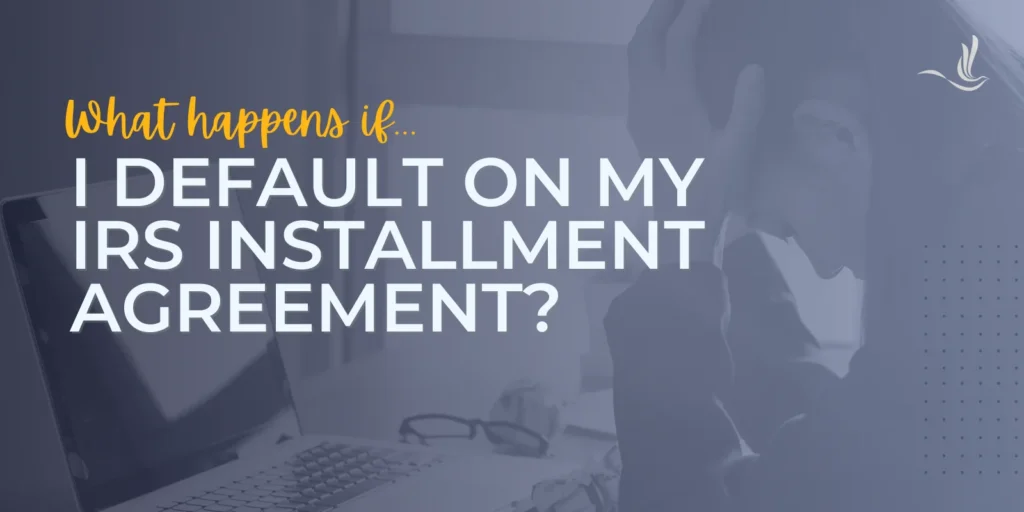
Entering into an installment agreement with the IRS can provide taxpayers with a manageable way to pay off their tax liability over time. However, defaulting on an IRS installment agreement can lead to serious consequences. Here, we’ll review the potential repercussions and the steps you can take to mitigate them.
What Does it Mean to Default on an IRS Agreement?
Defaulting on an IRS installment agreement means that you have failed to meet the terms of the payment plan established with the IRS. This can happen for several reasons, including missing a scheduled payment, failing to file required tax returns, or incurring additional tax debts. Defaulting on your IRS installment agreement can lead to serious consequences.
Immediate Consequences
It’s important to note that there are a few immediate consequences associated with defaulting on your IRS installment agreement.
Reinstatement of Full Debt Amount
When you default on your IRS installment agreement, the entire amount of your tax debt becomes due immediately. The IRS will no longer honor the payment plan, and you will be expected to pay the full balance at once.
Accrual of Penalties and Interest
Defaulting on your installment agreement means that penalties and interest on your tax debt will continue to accrue. This can significantly increase the total amount you owe.
Loss of Future Tax Refunds
The IRS may apply any future tax refunds to your outstanding debt. This means that any expected refunds will be used to pay off your tax balance instead of being issued to you.
Collection Actions
The IRS will send you Notice CP523, informing you that you have defaulted on your installment agreement. This notice will outline the amount due and provide instructions on how to resolve the default. If the default is not resolved, the IRS can levy your assets. This means they can seize your property, including bank accounts, wages, and other assets, to satisfy the debt. The IRS may even file a federal tax lien against your property. A lien is a legal claim against your property to secure payment of the tax debt. This can affect your credit score and make it difficult to sell or refinance your property.
In severe cases, the IRS may take legal action to collect the debt. This can include filing a lawsuit against you to recover the outstanding balance. The IRS can also garnish your wages, taking a portion of your paycheck directly to satisfy your tax debt. To make matters worse, defaulting on an installment agreement can make it difficult to enter into another agreement with the IRS in the future. They may require more stringent terms or a higher initial payment to establish a new agreement.
Steps to Take If You’re Struggling
If you anticipate trouble making a payment, contact the IRS as soon as possible. They may be able to work with you to modify your agreement or provide a temporary deferment. However, if you have already defaulted, you can request to have your installment agreement reinstated. You will need to provide a valid reason for the default and show that you can meet the terms of the agreement going forward.
Consider hiring a tax professional or a tax attorney. They may be able to negotiate better terms on your behalf. If an installment agreement is no longer feasible, consider other options such as an Offer in Compromise (OIC), where you settle your debt for less than the full amount owed, or a Currently Not Collectible (CNC) status, which temporarily pauses collection actions due to financial hardship.
Tax Help for Those with IRS Installment Agreements
Defaulting on an IRS installment agreement can lead to a series of severe financial and legal consequences, including the reinstatement of the full debt amount, penalties and interest, asset levies, and tax liens. It is crucial to stay proactive and communicate with the IRS if you are having difficulty making payments. Seeking professional advice and exploring alternative payment options can help you avoid the harshest consequences and work towards resolving your tax debt. Remember, if you feel overwhelmed from dealing with the IRS on your own, it may be time to contact a tax professional. Optima Tax Relief is the nation’s leading tax resolution firm with over $3 billion in resolved tax liabilities.
If You Need Tax Help, Contact Us Today for a Free Consultation